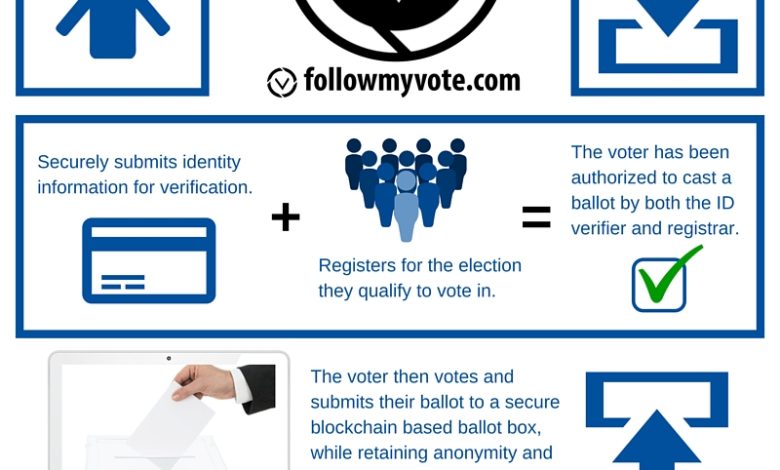Blockchain and the Future of Voting Systems

- Understanding the basics of blockchain technology
- Challenges of traditional voting systems
- Benefits of implementing blockchain in voting
- Security concerns and solutions in blockchain voting systems
- Case studies of successful blockchain voting projects
- The potential impact of blockchain on the future of democracy
Understanding the basics of blockchain technology
Blockchain technology is a decentralized, distributed ledger system that securely records transactions across a network of computers. Each block in the chain contains a list of transactions, and once a block is added to the chain, it is immutable and cannot be altered. This transparency and security make blockchain an ideal solution for voting systems, as it can help ensure the integrity and accuracy of the voting process.
One of the key features of blockchain technology is its ability to provide transparency. Each transaction is recorded on a public ledger that is accessible to all participants in the network. This means that every vote cast in a blockchain-based voting system can be verified by anyone, ensuring that the results are accurate and tamper-proof.
Another important aspect of blockchain technology is its security. The decentralized nature of the blockchain makes it extremely difficult for any single entity to manipulate the data. Additionally, the use of cryptographic algorithms ensures that each transaction is secure and cannot be altered without detection.
Blockchain technology also offers increased efficiency in the voting process. By eliminating the need for intermediaries and streamlining the verification process, blockchain can help reduce the time and cost associated with traditional voting systems. This can lead to higher voter turnout and increased trust in the electoral process.
Overall, understanding the basics of blockchain technology is essential for realizing its potential in revolutionizing voting systems. By leveraging the transparency, security, and efficiency of blockchain, we can create a more reliable and inclusive voting process for the future.
Challenges of traditional voting systems
Traditional voting systems face numerous challenges that can hinder the integrity and efficiency of the voting process. One of the main issues is the potential for fraud and manipulation in paper-based systems, where ballots can be tampered with or miscounted. Additionally, traditional voting methods often require voters to physically travel to polling stations, which can be inconvenient and inaccessible for many individuals, leading to low voter turnout.
Moreover, traditional voting systems are often slow and labor-intensive, requiring significant resources to count and verify votes manually. This can result in delays in announcing election results and increase the likelihood of errors in the tabulation process. Furthermore, traditional systems lack transparency and accountability, making it difficult for voters to verify that their votes have been accurately recorded and counted.
Another challenge of traditional voting systems is the lack of inclusivity for remote or overseas voters, who may face barriers to participating in elections due to distance or logistical constraints. This can disenfranchise a significant portion of the population and undermine the democratic process as a whole. Overall, the limitations of traditional voting systems highlight the need for innovative solutions, such as blockchain technology, to modernize and secure the voting process for the future.
Benefits of implementing blockchain in voting
Implementing blockchain in voting systems offers numerous benefits that can revolutionize the way elections are conducted. Some of the key advantages include:
- **Transparency**: Blockchain technology ensures that all transactions are recorded on a public ledger that is accessible to all parties involved. This transparency helps to build trust in the voting process and reduces the risk of fraud.
- **Security**: The decentralized nature of blockchain makes it extremely secure against hacking and tampering. Each vote is encrypted and linked to the previous one, creating a chain that is virtually impossible to alter.
- **Accuracy**: By using blockchain, the integrity of each vote can be verified, ensuring that the results are accurate and reliable. This can help to eliminate errors and discrepancies in the voting process.
- **Efficiency**: Blockchain technology can streamline the voting process by allowing voters to cast their ballots electronically from anywhere in the world. This can help to increase voter turnout and reduce the cost and time associated with traditional voting methods.
- **Accessibility**: Blockchain voting systems can make it easier for people with disabilities or those living in remote areas to participate in elections. By providing a secure and user-friendly platform, blockchain can help to ensure that everyone has equal access to the voting process.
Overall, implementing blockchain in voting systems has the potential to enhance the democratic process by making it more transparent, secure, accurate, efficient, and accessible to all citizens. As technology continues to evolve, blockchain is poised to play a crucial role in shaping the future of voting systems around the world.
Security concerns and solutions in blockchain voting systems
When it comes to blockchain voting systems, there are certainly security concerns that need to be addressed. One of the main worries is the potential for hacking or manipulation of the system. This is a valid concern, as any digital system is vulnerable to cyber attacks. However, there are solutions that can help mitigate these risks and ensure the integrity of the voting process.
One solution is the use of encryption to secure the data stored on the blockchain. By encrypting the information, it becomes much more difficult for hackers to access or alter it. Additionally, the decentralized nature of blockchain technology means that there is no single point of failure, making it harder for malicious actors to disrupt the system.
Another security measure that can be implemented is the use of multi-factor authentication. This adds an extra layer of protection by requiring users to provide more than one form of verification before they can access the system. This can help prevent unauthorized access and ensure that only legitimate users are able to participate in the voting process.
Furthermore, regular audits and monitoring of the blockchain can help detect any suspicious activity and address it before it becomes a major issue. By keeping a close eye on the system and promptly responding to any potential threats, the integrity of the voting process can be maintained.
Overall, while there are security concerns associated with blockchain voting systems, there are also effective solutions that can help address these issues. By implementing encryption, multi-factor authentication, and regular monitoring, the security of the system can be greatly enhanced, ensuring that voters can have confidence in the integrity of the voting process.
Case studies of successful blockchain voting projects
Several successful **blockchain voting projects** have demonstrated the potential of this technology to revolutionize the way we conduct elections. These case studies showcase the various benefits of using blockchain for voting systems, including increased transparency, security, and accessibility.
- One notable example is the **Estonian e-Residency** program, which allows citizens to vote securely online using blockchain technology. This system has been praised for its efficiency and convenience, as well as its ability to prevent fraud and tampering.
- Another successful **blockchain voting project** is the **Sierra Leone** presidential election in 2018, where blockchain technology was used to verify the integrity of the voting process. This initiative helped to increase trust in the electoral system and ensure a fair and accurate outcome.
- Additionally, the **Democratic Party of India** has implemented blockchain-based voting systems for internal elections, leading to greater participation and engagement among party members. This innovative approach has streamlined the voting process and reduced the risk of manipulation.
Overall, these case studies highlight the potential of blockchain technology to transform voting systems and enhance democracy. By leveraging the security and transparency of blockchain, we can create more reliable and inclusive electoral processes that empower citizens and strengthen trust in democratic institutions.
The potential impact of blockchain on the future of democracy
Blockchain technology has the potential to revolutionize the future of democracy by enhancing the security, transparency, and efficiency of voting systems. By leveraging blockchain’s decentralized and immutable nature, governments can ensure that elections are conducted in a secure and tamper-proof manner.
One of the key benefits of using blockchain in voting systems is the ability to provide a transparent and verifiable record of all transactions. This can help to prevent fraud and manipulation, as each vote is recorded on the blockchain and cannot be altered or deleted. Additionally, blockchain technology can enable real-time monitoring of election results, allowing for greater trust in the electoral process.
Furthermore, blockchain can help to increase voter turnout by making the voting process more convenient and accessible. Through the use of digital identities and secure voting platforms, voters can cast their ballots from anywhere in the world, eliminating the need for physical polling stations and paper ballots.
Overall, the integration of blockchain technology into voting systems has the potential to strengthen democracy by ensuring the integrity of elections, increasing voter participation, and fostering trust in the electoral process.



